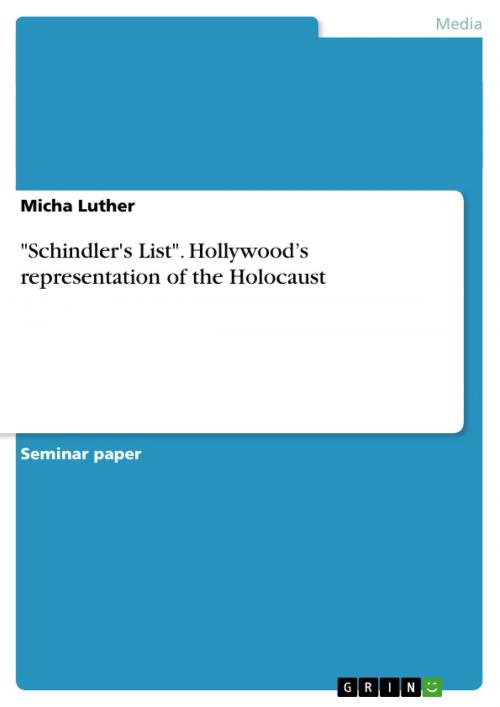'Schindler's List'. Hollywood's representation of the Holocaust
Nonfiction, Entertainment, Performing Arts, Film| Author: | Micha Luther | ISBN: | 9783656831846 |
| Publisher: | GRIN Verlag | Publication: | November 6, 2014 |
| Imprint: | GRIN Verlag | Language: | English |
| Author: | Micha Luther |
| ISBN: | 9783656831846 |
| Publisher: | GRIN Verlag |
| Publication: | November 6, 2014 |
| Imprint: | GRIN Verlag |
| Language: | English |
Seminar paper from the year 2013 in the subject Film Science, grade: 2,7, University of Freiburg, language: English, abstract: 'Schindler's List' is certainly one of the most famous works about the Holocaust that has ever been created so far. Since the 1970s the memory of the Holocaust became more and more integrated as an important element not only of Jewish Amer-ican culture but of American culture in general. The film that was published in 1994 by one of Hollywood's most famous directors can be seen as a milestone in this process of the 'Americanization of the Holocaust'. Other very successful projects preceded that aimed to preserve the memory of the Holocaust in American culture such as the TV series Holocaust or the opening of the National Memorial Museum in 1993. This process of integrating the Holocaust as an essential part in American culture is described in Peter Novick's study The Holocaust in American Life. I will try to analyze the film as part of this process and raise several questions about its meaning in this context. I will at first examine the historical background of the time when the film was published. I will try to find out what makes Schindler's List typical for an American Hollywood movie and how the film 'Americanizes' in this way the subject of the Holocaust. Before that I will examine how the idea of Schindler's List emerged and how it became possible that this delicate topic was chosen by Spielberg who was rather known for his spectacular entertainment movies up to this point. To answer these questions I will also analyze elementary elements of the film: suspense structure, characters, technical aspects and also shortly deal with the reception and critics of the movie. Finally I will discuss the question which impact the movie had or could have for the viewer's perception of the Holocaust and in which way the movie shaped what Novick calls the 'collective memory' of the Holocaust.
Seminar paper from the year 2013 in the subject Film Science, grade: 2,7, University of Freiburg, language: English, abstract: 'Schindler's List' is certainly one of the most famous works about the Holocaust that has ever been created so far. Since the 1970s the memory of the Holocaust became more and more integrated as an important element not only of Jewish Amer-ican culture but of American culture in general. The film that was published in 1994 by one of Hollywood's most famous directors can be seen as a milestone in this process of the 'Americanization of the Holocaust'. Other very successful projects preceded that aimed to preserve the memory of the Holocaust in American culture such as the TV series Holocaust or the opening of the National Memorial Museum in 1993. This process of integrating the Holocaust as an essential part in American culture is described in Peter Novick's study The Holocaust in American Life. I will try to analyze the film as part of this process and raise several questions about its meaning in this context. I will at first examine the historical background of the time when the film was published. I will try to find out what makes Schindler's List typical for an American Hollywood movie and how the film 'Americanizes' in this way the subject of the Holocaust. Before that I will examine how the idea of Schindler's List emerged and how it became possible that this delicate topic was chosen by Spielberg who was rather known for his spectacular entertainment movies up to this point. To answer these questions I will also analyze elementary elements of the film: suspense structure, characters, technical aspects and also shortly deal with the reception and critics of the movie. Finally I will discuss the question which impact the movie had or could have for the viewer's perception of the Holocaust and in which way the movie shaped what Novick calls the 'collective memory' of the Holocaust.















